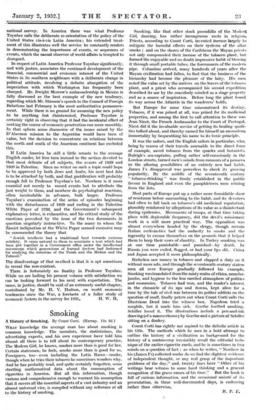Smoking
A History of Smoking. By Count Corti. (Harrap. 128. 8d.) WHAT knowledge the average man has about smoking is common knowledge. The moralists, the statisticians, the advertising experts, and his own experience have told him almost all there is to tell about its contemporary practice. The Modern Girl, he knows, smokes more than is good for her. Certain statesmen, he feels, smoke more than is good for us. Foreigners, too—even including the Latin Races—smoke, though when he tries their tobacco he sometimes wonders why. And he has probably read, and quite certainly forgotten, some startling mathematical data about the consumption of cigarettes in America. But all this information, though various and comprehensive enough to warrant his assumption that it covers all the essential aspects of a vast industry and an almost universal vice, is compiled without any reference at all to the history of smoking,
Smoking, like that other stock peccadillo of the Modern Girl, dancing, has rather incongruous roots in religion. Priests, according to Count Corti, invented incense largely to mitigate the harmful effects on their systems of the altar 'smoke ; and on the shores of the Caribbean the Mayan priests not only compounded their incense of the tobacco plant, but formed the enjoyable and no doubt impressive habit of blowing it through small portable tubes, the forerunners of the modern
pipe. Columbus arrived, many hundreds of years after the Mayan civilization had fallen, to find that the business of the hierarchy had become the pleasure of the laity. His men noted the value set by the natives on the leaves of the tobacco plant, and a priest who accompanied his second expedition described its use by the oracularly minded as a stage property and as a source of inspiration. Before long the plant found its way across the Atlantic in the wanderers' holds.
But Europe for some time misconstrued its destiny.
Tobacco, if it was prized at all, was prized for its medicinal properties, and among the first to call attention to these was Jean Nicot, the French Ambassador to the Court of Portugal. Nicot did it the invaluable service of getting its healing quali- ties talked about, and thereby earned for himself an anomalous immortality by bequeathing his name to its toxic principle.
It was-the sailors, and the English sailors in particular, who, being by reason of their travels amenable to the direct force of example, saved tobacco from the quacks and botanists. Raleigh's sea-captains, pulling rather self-consciously in the London streets, turned men's minds from rumours of a panacea to the alluring possibilities of an entirely new bad habit. James l's disapproval was powerless to check its growing popularity. By the middle of the seventeenth century " tobacco-drinking " was firmly established in the public favour in England and even the pamphleteers were retiring from the lists.
Most parts of Europe put up a rather more formidable show
of resistance before succumbing to the habit, and its devotees had often to fall back on tobacco's old medicinal reputation, plausibly reinforced by allegations of its value as a disinfectant during epidemics. Movements of troops, at that time taking place with deplorable frequency, did the devil's missionary work in a still more practical way. The opposition was almost everywhere headed by the clergy, though certain Italian ecclesiastics had the audacity to smoke and the ingenuity to excuse themselves on the grounds that it helped them to keep their vows of chastity. In Turkey smoking was at one time punishable—and punished—by death. In Russia you were exiled, flogged, or had your lips slit. China and Japan accepted it more philosophically.
Richelieu saw money in tobacco and clapped a duty on it
without more ado, and through the seventeenth century states- men all over Europe gradually followed his example. Smoking was translated from the misty realm of ethics, mumbo- jumbo, and hygiene to the less rarefied atmosphere of polities and economics. Tobacco had won, and the reader's interest in the chronicle of its ups and downs, kept alive for a time by the tale of civil war between its politer addicts on the question of snuff, finally peters out when Count Corti calls the Illustrious Dead into the witness box. Napoleon tried a narghile, but it made him sick. Goethe loathed smoking. Schiller loved it. The illustrations include a pen-and-ink drawing fof a summerhouse) by Goethe and a picture of Sehiller sitting on a donkey.
Count Corti has rightly not aspired to the definite article in
his title. The methods which he uses in a bold attempt to outline the history of a civilization as background for the history Of a controversy irresistibly recall the editorial tech- nique of the earlier cigarette cards, and he is sometimes in two minds on a question of fact : as when he writes, " Nowhere in his (James I's) collected works do we find the slightest evidence of independent thought, or any real grasp of the important problems of the day," and, twenty lines later " Other of his writings bear witness to some hard thinking and a general recognition A the grave errors of his time." But the book is full of curious information, and the occasional naivete of its presentation,, in. these well-documented days, is endearing rather than otherwise.
R. P. F.






































 Previous page
Previous page